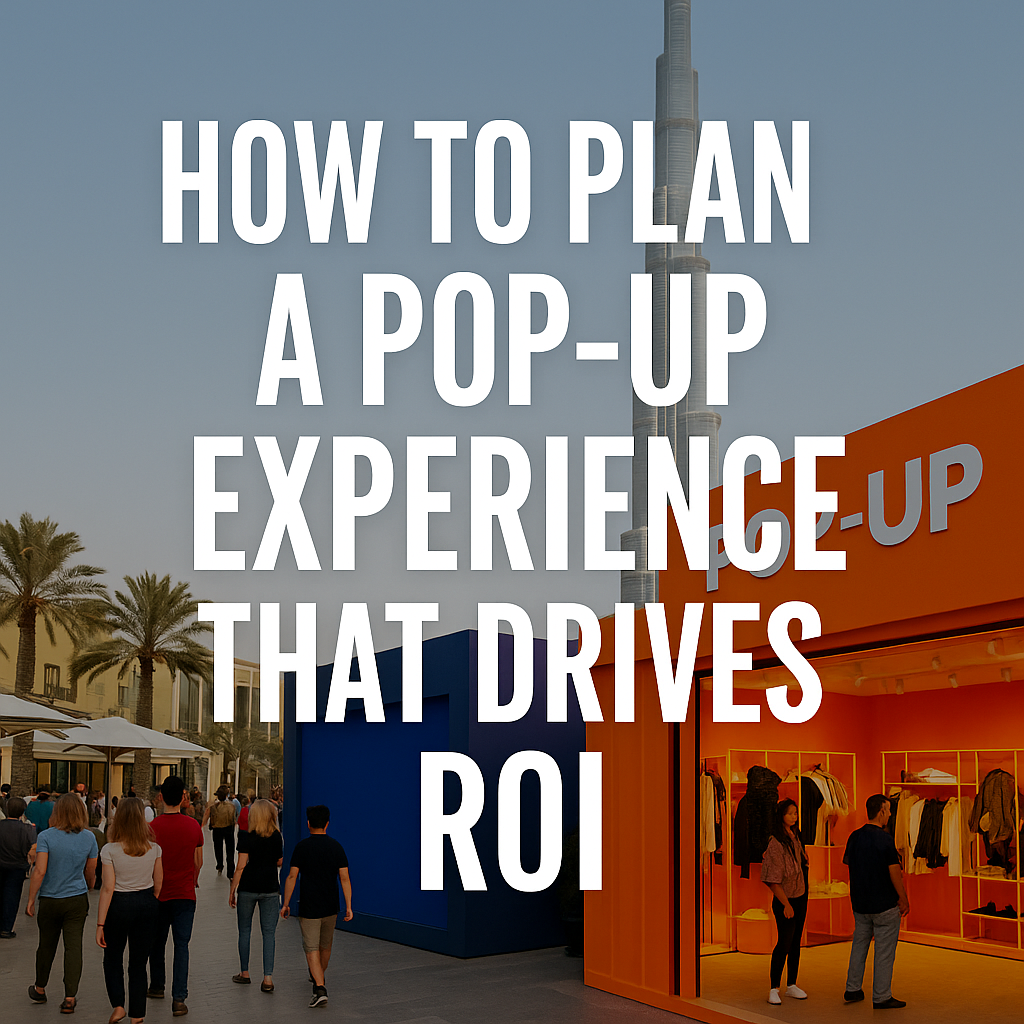
In today’s experience-driven economy, pop-up events are no longer just trendy marketing tactics they’re strategic brand experiences that can generate serious return on investment (ROI) when executed with precision. Whether you’re a retail brand, tech innovator, or B2B enterprise, Dubai’s dynamic market offers an ideal setting for immersive pop-up experiences that convert curiosity into loyalty and engagement into revenue.
Here’s how to plan a high-impact pop-up that not only attracts attention but delivers measurable business results.
1. Define Your Goals and Metrics for ROI
Before you scout locations or brainstorm concepts, clarify your purpose. Are you:
- Launching a product?
- Collecting leads?
- Driving direct sales?
- Boosting brand awareness?
ROI Metrics to Track:
- Cost per lead or customer acquisition
- Social media engagement and impressions
- Sales conversions during and after the event
- Website traffic uplift
- Press coverage or influencer mentions
Pro tip: Set KPIs upfront and integrate tools (like QR codes, NFC, and lead capture apps) to track data in real time.
2. Choose a Strategic Location in Dubai
Location is everything for a pop-up. In Dubai, choose a spot aligned with your audience and business objective.
Top Pop-Up Locations in Dubai:
- City Walk – upscale shoppers and families
- Dubai Design District (D3) – creative and tech-savvy crowd
- The Dubai Mall – high footfall and luxury positioning
- Global Village – multicultural exposure
- Expo City – business and innovation-focused audience
3. Design with Experience in Mind
A pop-up must be more than a booth or store. It needs to be experiential and shareable.
Key Design Elements:
- Interactive displays or demo zones
- Augmented reality (AR) try-ons or walkthroughs
- Photo-worthy installations to encourage social sharing
- Live customization or product personalization
- Seamless AV integration and mood lighting
Dubai audiences value luxury and innovation combine both in your design to stand out.
4. Incorporate a Strong Digital Component
A well-integrated digital strategy extends the life and reach of your pop-up.
Digital ROI Drivers:
- Live streaming for hybrid reach
- Social media contests with branded hashtags
- QR codes linking to landing pages or exclusive offers
- Influencer and micro-influencer collaborations
- On-site retargeting pixel deployment
Ensure all digital assets link back to measurable goals such as newsletter signups, downloads, or purchases.
5. Engage the Right Partners and Vendors
From AV suppliers to production managers, choosing the right vendors in Dubai can make or break your event.
Key Vendor Checklist:
- Event production and fabrication
- Licensing and permits
- Staffing and brand ambassadors
- Tech and connectivity (Wi-Fi, tablets, etc.)
- Security and insurance
Work with Dubai-based agencies that understand the market, logistics, and compliance requirements.
6. Create a Post-Event Conversion Funnel
What happens after your pop-up is equally critical.
Post-Event ROI Tactics:
- Retarget attendees with email campaigns or exclusive offers
- Use collected data to personalize follow-ups
- Turn insights into product development or market positioning
- Publish a recap on your blog and tag attendees
Nurture leads beyond the pop-up to truly maximize ROI.
7. Budget Smartly, Measure Aggressively
ROI doesn’t always mean sales it could be brand awareness, lead gen, or new partnerships.
Example ROI Breakdown:
- Total Spend: AED 120,000
- Leads Collected: 1,200
- Cost per lead: AED 100
- Sales conversions: 180 (15%) with average purchase of AED 1,200
- Gross revenue: AED 216,000
Positive ROI with brand exposure as added value
Facts
A pop-up in Dubai is more than a short-term stunt it’s a brand opportunity with long-term value. By aligning strategic goals with creative execution and using data to track ROI, brands can turn temporary activations into lasting business impact.
Typically 3–10 days, depending on location and audience footfall.
October to April, when tourism and events peak.
Track sales, leads, engagement, and cost-per-acquisition metrics.
Yes, you’ll need approvals from Dubai Municipality and location-specific authorities.
AED 80,000 to AED 250,000 depending on size, design, and duration.